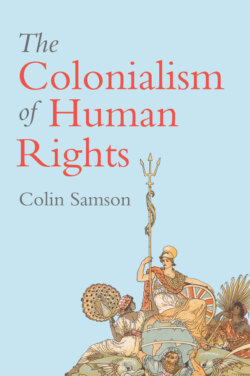Читать книгу The Colonialism of Human Rights - Colin Samson - Страница 5
Acknowledgements
ОглавлениеExchanges with many people have seeped into my thinking and writing.
For twenty-five years, I have researched and worked with indigenous groups in many places, and these experiences sensitized me to the ongoing nature of colonialism. Seeing how indigenous peoples struggle to maintain their lands and ways of life against the power of national governments to dispossess and assimilate them made me aware of parallels with formerly colonized and enslaved peoples. I saw such parallels while working with the Innu of the Labrador-Quebec Peninsula, joining families in hunting camps on lands officially earmarked as ‘Crown land’, and attending meetings between Innu and the Canadian government. Among many, I would like to thank Napes Ashini, Marcel Ashini, George Rich and Tony Jenkinson. As a volunteer at the Oceti Sakowin camp in 2016, I participated in the Water Protectors movement at Standing Rock to contest an oil pipeline driving through Sioux lands and sacred places. I would like to thank all those who educated me and took me to Standing Rock while I was at the University of Wyoming, as a visiting professor in 2015–16. These include Caskey Russell, Reinette Tendore and Giz Tendore, and also Tory Fodder, who wasn’t at Standing Rock, but was a great source of wisdom.
Some people have read whole chapters of my book, and I owe much to the insights they provided me. Øyvind Ravna of the University of Tromsø not only taught me a lot about treaties and international law, but also read Chapter 5 and gave me valuable feedback. Nawel Hamidi, a Ph.D. student at the University of Essex, read Chapter 4, providing expert guidance on the continuous histories of colonialism in Algeria. Stephen Small of the University of California at Berkeley thoroughly read, commented on and gave me new ideas on Chapter 3. Conversations with Lydia Morris, my colleague at Essex, helped a lot with understanding and applying the concept of civic stratification. Exchanges with many others were equally valuable: Andrew Fagan, Director of Human Rights at Essex, on the political positions in the human rights community; Rob Schehr of Northern Arizona University on social justice in the USA; my colleague Carlos Gigoux on US intervention in Latin American politics; my former Ph.D. student Liz Cassell, on colonial law; my colleagues Jason Sumich and Afia Afenah on the democracy – economic growth links in Africa; Pierrot Ross-Tremblay of the University of Ottawa on the concept of cultural obliteration; and my partner, Nicola Gray, on the contemporary arts and colonialism.
For almost twenty years, I have taught a module called ‘Colonialism, Cultural Diversity and Human Rights’. The students taking it have motivated and encouraged me, and all have contributed something to this book. I would like specially to thank Passent Moussa and Malika Irshad for showing me how pervasive colonial laws are in formerly colonized territories. The University of Essex Sociology department gave me time, space and support to complete the book. Lastly, librarian Sandy Macmillan ordered every single book I needed, and even came up with many that I hadn’t thought of.
